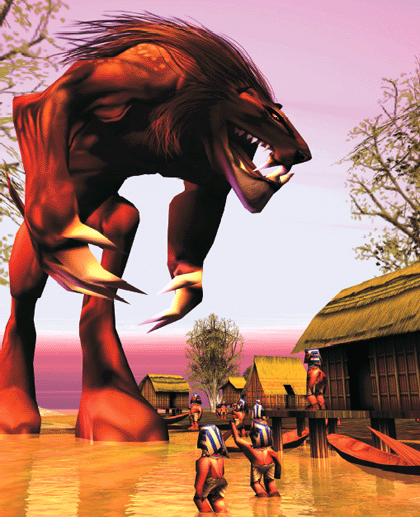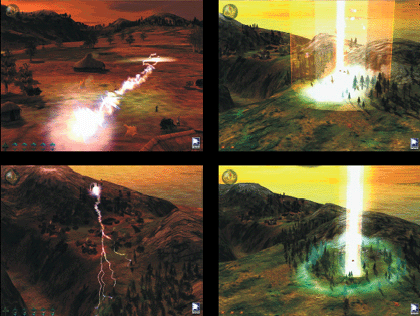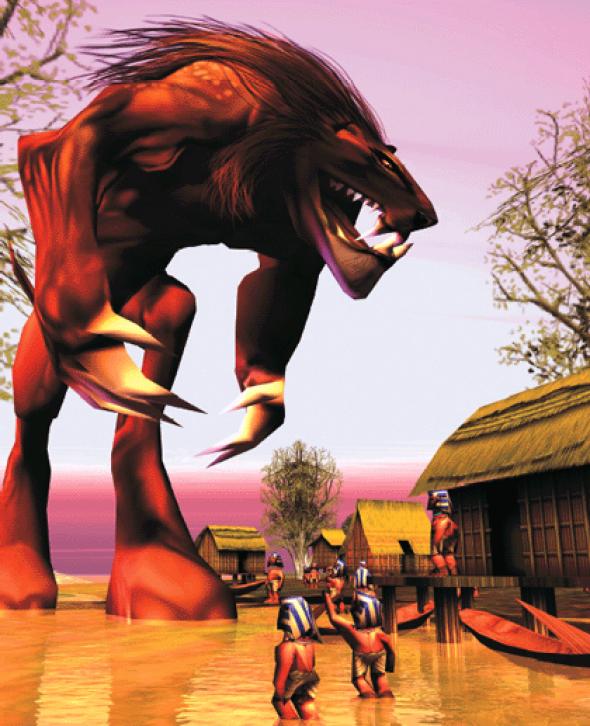Deus ex Machina ("Don't simulate the world, simulate what people think is the real world.")
God games are a genre of video games which position the player as an invisible controller/manager/all-seeing-being of a simulated real-time world. From the early days of pixellated three-quarter view landscapes with tiny bit-mapped creatures running around, to today's slick, beautifully rendered, near-photographic 3D panoramas with convincing creatures and stunning special effects, the task remains the same: to nurture, coerce and assist the inhabitants or bully, maim and generally subject your populace to a lighter shade of Armageddon. The result of your labours is to either bring peace and tranquillity to the kingdom, or throw it into terminal darkness. Grandfather of God games is Peter Molyneux, one of the figureheads of the games world and developer of the soon to be released title Black and White– featuring bells, whistles and a huge creature that you directly control. John Paul Bichard catches up with Peter Molyneux at his Guildford bunker and tries to dig beneath the cranium of the man who would be God.
 JPB When can we expect to see Black and White?
JPB When can we expect to see Black and White?
PM March is the date we're aiming at. But developing games is like walking through quicksand – you feel like you are moving nowhere half the time, but in reality you are slowly moving forward.
JPB You have talked about your childhood fascination with ant communities – the idea of you as a kind of 'ant god'. What drove you to the point of doing the God games.
PM You give any kid a few sticks of wood and a couple of play figures and they develop this world with good and bad guys. It was inevitable that I was going to do it too. But the fascination I had in mind was discovering an ants' nest and being able to experiment with it. I did the most unspeakable things.
JPB Such as?
PM I stuck a hose in the middle of the ants' nest to see what would happen, and then came back a day later to notice that they had rebuilt one half of it. This entire little ants' nest became a pet to me. But it was a pet about which I would wonder what nasty thing I could do to it; how I could bring it close to death, and then bring it back, which is probably indicative of me becoming a games designer or a mass murderer – I don't know which.
JPB It's not so abnormal to want to destroy these communities – or 'nature' – as a child. For me, it was about chasing individual ants, rather than dealing with the whole community.
PM I always desperately wanted to see the queen ant. Since I never saw her, I built up an impression of what she looked like – bigger and much more prestigious than she perhaps was. It was definitely always on a colony basis, though.

JPB And this was still as a child?
PMYes, although I have to say that I did not stop playing with Lego.
JPB Doing what?
PM Building little worlds. I used to build the most sophisticated things from Lego. Not beautiful things, just sophisticated things, with one sole purpose in mind – and that was to destroy what I had built. For me, that is also a fundamental part of games design: if you allow someone to create a world, you must also allow them to destroy that world. In SimCity for example, it's great fun building a city up, but it is even more fun when you have a couple of earthquakes and fire storms and to see what happens. I believe this is at the heart of what a good game is, really.
JPB Yes, but I guess it is also quite childlike because it takes away a level of responsibility. When you're destroying something, you destroy it for fun, as opposed to dealing with the actual consequence. So, in Quake let's say, and in fact in a lot of games, if you lose an arm, you immediately come back with a new arm. It would actually be quite interesting if you had to take on the consequences of losing and arm; or even rest for a few days.PM Well, this is what Black and White is all about. When thinking about its design, it occurred to me that if you look at society, the end result of destruction isn't always bad. There are always side consequences to what has happened: in Black and White it doesn't matter if you destroy all this stuff; it just makes you more evil. All the game does is reflect the way that you are – it doesn't say you've got half a chance of winning, or half a chance of completing it; it just says that you are more likely to complete it as an evil individual than as a good one. I think maybe one of the attractions of the ant colony and the Lego and SimCity is that you can destroy without terrible consequences. In the middle of a game of SimCity, you can't suddenly decide that you will go on playing this game for another six hours and then destroy half the city, because you're cutting off your nose to spite your face. When you're at the end of it and you think “I've invested all this time into it”, you'd think your first reaction would be: “Oh well, I want to look after it.” But no, your first reaction is to go: “No you fools, you shouldn't have come in in the first place. Ha Ha, I've got you!” Maybe that is a lot to do with human nature, and being able to do things without severe consequences. And perhaps that is an interesting way in which computer games can do something that other mediums cannot.
JPB Yes, but they are in the very early stages.
PM Like a lot of people, I use the analogy of early film. I think computer games are very primitive compared to what film is now. The reason we're building games with lots of violence and unsophisticated emotions is that the situation is rather like it was in early Hollywood. The vast majority of films produced then were slapstick comedies, because there was an idea that that's what people wanted.
JPB I think games are quite a bit further on than that, don't you? It's not to do with things like style or genre any more. Whereas earlier games were about a kind of singular action – single moments, single ideas – I think they have gone through several generations and are now probably in late adolescence, if you will. But even something like Black and Whiteis dealing with quite simple dualities, isn't it? There is a desperate need to go up another level.
PM Well, they will. It is just that several things simply have to happen before that is possible. You couldn't have made a lot of the films that are being made now when we had silent black and white movies. It's the same with games because most of them are still iconical in nature – you know, you still see cutey creatures moving around with two arms and two legs but their faces are as sophisticated as a block of wood. But, that is going to change, and within the next two years with things like Playstation2. That will instigate as big a change in the gaming industry as the talkies did in film.
JPB I don't think it even goes back that far, because even in the early days of talkies all the action was really exaggerated and cardboard-like.
PM Yes, with some notable exceptions, and I think there are some notable exceptions in the games industry as well. In general, it is impossible to show emotion other than by using your imagination. After you've stuck a knife in someone or hit someone across the room it doesn't actually look like it hurts. What I think this industry needs is a massive amount of processing power to enable us to show that.
JPB But what about the actual intellectual input? In the game Half Life for example, there was, for the first time, a proper engagement with the person who was placed in the world as the player. You walked down the corridor and the characters, timing, space, the whole feel of the game was geared towards including you as a consequential individual. Interestingly, this wasn't only about the technology; it was also about very good scripting and writing.
PM Well, yes, new technologies are like introducing speech or colour into film. Of course, what we do with it is then a completely different thing. Unfortunately, most of us in the games industry are programmers and graphic artists, not scriptwriters, cameramen or directors. That's why a lot of the scenarios and plots that you've seen in the past have been very one-dimensional and cardboard-like. They are crafted by gamers for gamers. However, when we have tools that allow us to create characters that look and express like real characters and can be choreographed by a scriptwriter, then it can get very very interesting. It will make the Half Life script – as engaging as it was in comparative terms to the rest of the computer games scene – very primitive. The games that are going to win out in the future are those that combine the high technology of visualisation with high quality scripts and design. And that's going to make the whole process of making games just madly difficult. It's already madly difficult, but it's going to be insanely difficult. But, things are moving along. And if we as an industry want to reach the mass public, if we want to have lots of people understanding and playing games as another entertainment medium, then that's something we have to face. The scripts that will come out of computer games will be incredible because they can do more than films could ever do. I can write a computer games script that modifies itself for you as a player, personally. That is just not possible to do in a film – it is an untapped art form.

JPB I'm interested in your take on Japanese computer games.
PM I think the Japanese just have this incredible ability to pick the style that appeals to people. They've done it time and time again. The latest they're imposing upon us is PokÈmon, which, if you've seen that, has a style all of its own – it's very powerful and children just pick up on it immediately. They're the best in the world really for pinpointing styles that the mass market, the mass of people, will really like. It goes back to our earlier conversation, in that they pick good characters. If you look at their stories, they're weird and wacky and don't make very much sense, but they are centred around characters. It doesn't matter whether or not they insist that your character goes into a sausage factory, finds a magic carpet and flies away to the moon; the point is that what they do is suck you into those characters as quickly as they possibly can. The Japanese are talking about scriptwriting and characterisation before anybody else and they are reaping the rewards for doing that. It's something I think we're all going to have to worry about. For example, as it is a God game where you are just this disembodied spirit stirring up the ants' nest, characters are my biggest problem. Where are the characters that you can identify with? that guide you? that you communicate with? Fortunately, I do have an answer to these questions in these two characters – a good angel and evil devil – who communicate with you, the world and your creature. Those are the three things that are important.
JPB I'm fascinated as to why most of the games are about this third person. They're about you enacting the kind of God role. Let's say in Dungeon Keeperyou have this ability to go into characters, but you never actually identify with the character completely. Instead you end up being more like the camera onto this world.
PM Well, yes. I never wanted to say “That is you,” because when I read a book I always imagine, “I am like this character here.” That's why, when I see a film of that book, I'm always disappointed by that character. Being a computer programmer, you can probably guess my favourite book is Lord of the Rings. Well, I can imagine being Gandalf in Lord of the Rings.
JPB Oh really?
PM Absolutely! He is definitely the character I want to be! And when the Lord of the Rings film comes out, I'm going to be bitterly disappointed, crucified, that Gandalf doesn't look like me. A lot of the time when you're entertained, you are either told what you are or you are a spectator. Those are the two options. It would be nice for there to be a third option, where you are what you want to be and the rest of the world has to suffer or be rewarded through your actions.
JPB Is there an endpoint to Black and White?
PM Well, yes – because, through all this, you are playing through a story. Requests are made of you in the world by the things that you are responsible for. How you choose to deal with those requests determines how the world ends up, but during that process you play through a story. You have opponents and your creature goes through all sorts of trials and tribulations. There is one main opponent who is fighting against what you, as an individual player, believe in and, at the end of the game, you defeat that opponent. So, it's actually a classic story you're playing, but you're playing through it, not through the role of a character. You're playing your own character through this unfolding story. This means the opponent's challenges we throw at you are constantly being tailored in Artificial Intelligence to suit you personally. In a simplistic sense, this means that if you are a nice, kind and benevolent god within this world, the opponent you will face will be the opposite of that – evil and vicious and cruel, although it's a lot more subtle than that.
JPB Are there going to be possibilities for the other person to have characteristics other than aggressive ones? Ones that would run counter to yours, but provide more subtle choices for exerting control?
PM Yes, there are in fact several opponents within the story, but the final opponent is the one about which everything is opposite to everything you represent. Throughout the story you are constantly meeting characters who take a slight twist on that. What we're doing in the game is looking at all sorts of attributes about you: how you've reacted to different scenarios that have been put to you; how you've treated the world as a whole. That builds up this little profile which is not just good or evil: it's curious, it's aggressive, it's passive. There are 20 different variables helping construct your profile, and we can pitch things against you which pick up on some of those variables and not on others. We're getting fairly technical now.
JPB It's interesting the way you use ancient tribes and civilisations. Is this just because they are simple models that you can translate quite easily to what you can achieve with AI at the moment? Don't you believe it's reached a point with games where you can't caricature things that way any more?
PM Well, unfortunately we caricaturise things time and time again for our convenience and the same is true for films. I did a game called Theme Park about five years ago. The temptation was to go to Disneyland and ask them how you actually run a theme park – what are the mechanics of the finances, etc. But that was pointless. The simulation I built wasn't a simulation of a theme park; it was a simulation of what the average person thought was a theme park. That is the important thing: don't simulate the real world, simulate what people think is the real world. It's much more fun simulating what people think is a theme park because a real theme park is a boring business. Much like any other boring business, it's about people and jobs and whether it's time to build another ride because the theme park down the road has got a slightly bigger one. I think the same is true for film: when Indiana Jones ran into the temple, the Africans had spears and rings through their noses. Of course they're not like that. They're no different to us, but it's artistically convenient for us to have these caricatures. I agree with you that since I can simulate the actual life of what you would think a real Celtic tribe would have done it might be different. In other words, if I can say, “This is how they got married, this is how they had their children, this is how they ate, this is how they stored their food, this is what they did in winter,” we could do that. But would you as a games player really want that?
JPB No, no. All I wanted to get back to was this idea that, as games become wider and wider, there is a kind of responsibility attached. There is an argument, which I think is a fallacy, that games should be dumbed down as they become mass market...PM It's not the games that need to be dumbed down; it's the interface. That is the big limiting, or gating, factor every time – if it is an effort to play a game, you have a problem. The thing that needs to be much more sophisticated is the actual game itself. The responsibility you talk about is created by the fact that we can now do this stuff. We can now simulate this down the nth degree and people are going to be asking big questions of us.There are no more excuses.
JPB I don't know whether you get asked this a lot, but I wanted to ask whether there is a relationship between you and an idea of there being something that actually controls you?
PM God?!
JPB Well, since you make God games, something, I suppose.PM That's a very interesting question. I actually do believe that God does exist but I question the form in which he does. But we don't want to get into this discussion now because it's my favourite topic and that would mean a whole new article.
JPB I was just interested in it in relation to the so-called God game, but OK, have you thought about what's coming next? PM Unfortunately, I can't talk about it, because it's very hard to describe without giving an awful lot away. Obviously, the idea for Black and White has preoccupied me all of my life. It takes seconds to actually think of an idea for a game and anyone can do it, but actually refining that and thinking of all the problems and all the solutions takes a very long time. It's something that matures. You know, like a good cheese.
Mute Books Orders
For Mute Books distribution contact Anagram Books
contact@anagrambooks.com
For online purchases visit anagrambooks.com








